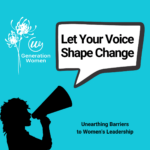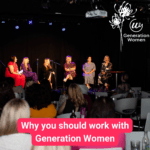Guest blog by Chloë Gillard from Version 1.
There are two quotes that I want to begin this blog with. Two quotes that when read together, give the perfect synopsis of what Allyship really is.
“With power comes great responsibility”
Winston Churchill
“And if we are lucky enough to be in a position of power, if our voice and our actions can mobilize change, don’t we have a special obligation? Being an ally can’t just be about nodding when someone says something we agree with – important as that is. It must also be about action. It’s our job to stand up for those who are not at the table when life-altering decisions are made. Not just those people who look like us. Not just those who need what we need. Not just those who have gained an audience with us. Our duty is to improve the human condition – in every way we can, for everyone who needs it.”
Kamala Harris
We need to view allyship as a strategic mechanism to fight injustice. It’s a way to promote equity in the workplace through supportive personal relationships and public acts of sponsorship and advocacy. As allies we must endeavour to drive systemic improvements to workplace policies, practices, and culture and see equity and inclusion as an essential golden thread throughout our organisations, not simply a nice to have add on.
Privilege
Before we dive into Allyship, I want to touch a little on the concept of privilege. The first thing to note is that privilege is a privilege. We often don’t seek out or ask for our privilege, it’s often something we are born into and it’s unearned. But what we do with that privilege is crucial. Being able to acknowledge the privileges you have can correspond with understanding your identity, and we must empower ourselves and those around us to use our privilege for good. With that, we can think of an ally as someone who uses their privilege to advocate on behalf of those who do not have the same privilege. The key word here is advocate – not speak on behalf, not use for our own superficial glory, but commit to actions that will empower and create space for those underserved or oppressed.
If you haven’t read Layla Saad’s book Me and White Supremacy, I highly encourage you do so. Whilst it’s based on allyship and racism, the principles are similar to being an ally in any shape or form. There’s a line in the book that really hits the mark, “Allyship is not self-defined – our work and our efforts must be recognised by the people we seek to ally ourselves with.”. Think about that for a second. What she is saying here is that you cannot label yourself an ally until the group you say you’re an ally for would label you. That’s powerful, as so many people would probably label themselves an ally but the group wouldn’t. Again, this goes back to the concept of allyship being rooted in action – Allyship is a verb not a noun.
So, what can you do to begin your journey of being an ally. Here are just some types of things you can do:
-
Educate Yourself
Do your homework. It can be tempting to simply ask all your questions to specific groups about their experiences with inequality and injustice. But that unfairly burdens them with emotional and cognitive labour. An ally takes the time to read, listen, watch, and deepen understanding first, then asks questions to learn even more.
-
Own your Privilege
Being an ally requires recognising the advantages, opportunities, resources, and power you’ve automatically been given while others have been denied them. This can be a tough experience because it often means admitting that you haven’t entirely earned your success. But it’s necessary.
-
Become a Confident
Make yourself available, listen open-handedly, and try to empathise with and validate their experiences. You need to establish trusting relationships with people from marginalised groups who trust in you and what you are committing to. Seek feedback from these groups but recognise the power dynamics at play.
-
Create Space
Don’t speak on behalf of groups, instead think of yourself as the emcee. Inviting others to have their voices heard and listened to. Allies learn to step out of the spotlight. They ensure invitations are given out for everyone to have a sit at the table.
-
Be Bold
You shouldn’t be waiting for those who are underserved to come forward when something is wrong. As an ally, you need to be bold enough and brave enough to stand up and challenge the narrative. Being an ally is not about making yourself look good or feel better. It’s about doing the just and right thing. We all have an opportunity—and a responsibility—to stand up for systemic change in our own teams, in our organisations, and in our wider society.
Allyship is a journey that takes time, effort, and an open mind. We must take off our own shoes to be able to place ourselves in others. We must embrace unlearning and relearning, listening to the stories of all kinds of people, and taking time for self-reflection. It is only then will we be able to challenge our assumptions, dismantle biased worldviews and norms, and open our eyes to the actions we need to make.
Chloe Gillard is the Global Diversity, Inclusion and Belonging Manager at Version 1. She started her career in the D&I space in the USA over 7 years ago, before moving back to NI in 2018. Since then she has worked across various industries, helping them on their diversity and inclusion journeys, and focusing on driving systemic change across our sectors and communities.








